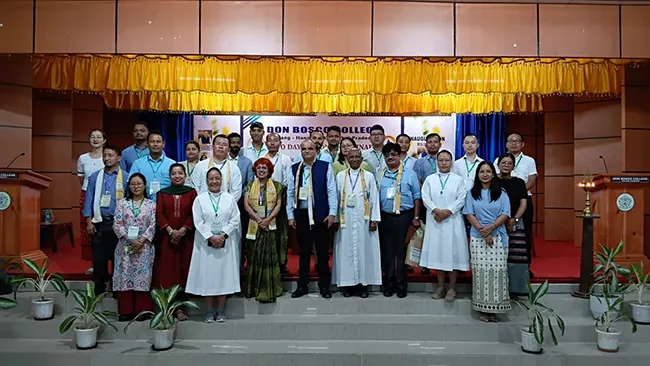JOLLANG, 8 Aug: The National Bank for Agriculture and Rural Development’s (NABARD) Itanagar Regional Office General Manager Damodar Mishra on Friday said that the bank has taken several initiatives, including rejuvenation of springs, to combat climate change in Arunachal Pradesh.
Participating in the inaugural day of a two-day national seminar on the topic ‘Democratic governance and public policy for navigating climate change’, organized by the political science department of the Don Bosco College (DBC) here, Mishra said that the NABARD is implementing a project for rejuvenation of springs in Papum Pare district under the National Adaptation Fund, seven springshed development projects, covering 1600 ha, and six tribal development projects, benefiting 1,200 farmers in establishing orchards in over 1,200 acres of land.
Stating that “climate change is real,” the NABARD GM said that the phenomenon offers a huge opportunity for research and development, particularly in Arunachal Pradesh, which is endowed with a rich biodiversity. He urged the organizers to come out with tangible action points “which need to be taken forward by the stakeholders.”
Shillong (Meghalaya)-based NEHU’s Political Science HoD Prof Susmita Sengupta spoke on democratic governance, inclusive development, and climate change.
Speaking on inclusive growth and climate change, she said that inclusive growth happens when the benefits of economic growth is shared by all.
“It focuses on creating a society where everyone is given opportunity to develop, which includes women, people with disabilities, and other marginalized sections,” Prof Sengupta said.
Inclusive development is possible only when everyone becomes partners in development, she said.
Prof Sengupta said also that development should not come at the cost of future generations.
Speaking on climate change, she highlighted the 2022 NITI Aayog report where it focused on COP 26, according to which the Ministry of Environment, Forest and Climate Change promoted the initiative to encourage climate-friendly behaviours through individuals and communities.
Prof Sengupta said that the report also highlighted how India’s development goals align with the UN’s Sustainable Development Goals, particularly climate action.
She also highlighted the COP 26’s Glasgow Climate Pact to reduce carbon emission, as well as the role played by local communities of Meghalaya in preserving the environment. In Meghalaya, sacred groves are community land and trees cannot be felled where the sacred groves are located, Prof Sengupta said.
She also highlighted how civil societies staunchly reject industrialization at the cost of environmental decline.
Prof Sengupa also highlighted the NABARD’s role in promoting climate resilient agriculture.
Tongam Rina, Deputy Editor of The Arunachal Times, spoke on ‘Environmental policy: The Pakke Declaration and palm oil policy’, while RGU Associate Professor and Sociology Department Head Dr Bikash Bage spoke on the topic ‘Climate change and social inequality: A sociological perspective on inclusive governance’.
During the first technical session, 10 research papers were presented on the theme ‘Institutions, community and climate adaptation’.
The session was chaired by NERIST Assistant Professor Dr Manmohan Mall.
During the second technical session, eight research papers were presented on the theme ‘Social justice, gender equity and sustainable development’. It was chaired by Jarbom Gamlin Government Law College Assistant Professor Dr Mizum Nyodu.
DBC Rector Fr CD Mathai thanked the NABARD for its continued support to the college’s growth in research and capacity building. He also thanked Prof Sengupta for accepting the responsibility as the keynote speaker.

